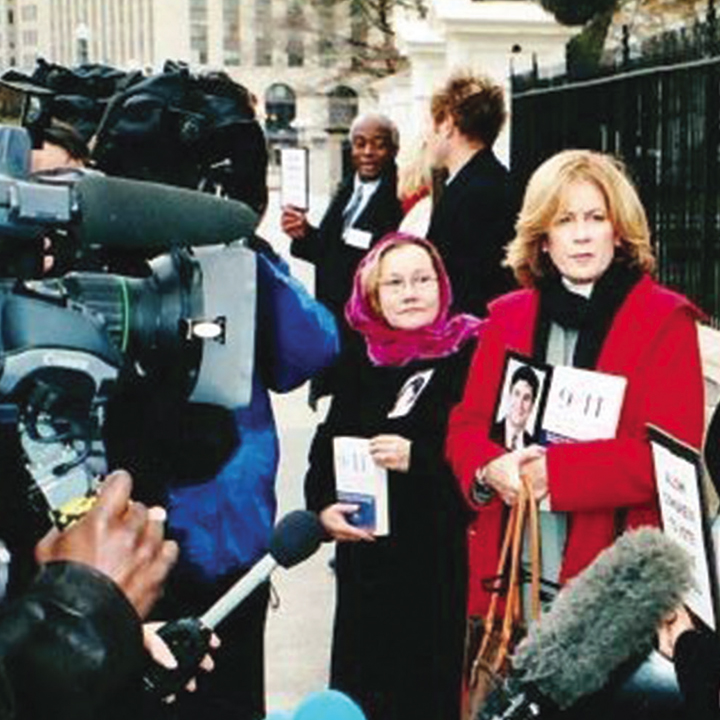Mass Violence Tip Sheets | Speaking with the Media

Voices Center for Resilience Mass Violence Tip Sheets
Considerations for Speaking with the Media
After Being Affected by Mass Violence
Events of mass violence are often covered by news outlets in great detail and spread immediately through vast coverage. Victims’ families, witnesses, and survivors are often contacted by the media for their personal perspective. Those affected should be aware that there are both potentially positive and negative consequences of speaking to the media. A desire to speak out is important, but preparation is key.
Possible Benefits of Sharing Your Story with the Media
- Sharing Your Story: Victims’ families and survivors talking with the media provides an opportunity to share their personal perspective and honor the lives of those who died, rather than focusing on the perpetrator.
- Public Awareness: Mass violence takes a toll on the individuals and the community at large. Media coverage can build awareness about the physical, emotional, spiritual, financial, social, and psychological needs of those impacted.
- Promoting Support: Speaking with the media may increase public support for victim assistance initiatives, including financial aid, support services, and mental health care.
- Inspiring Others: Revealing your circumstances will help others understand that they are not alone and may encourage them to seek the support they need to promote healing and recovery.
- Empowering Those Impacted: Sharing details about your experience may help you feel you have regained control of your life, by building public awareness and influencing change.
- Changing Public Policy: Victims’ families and survivors often engage in advocating for public policy changes to address inadequate government policies, in hopes of preventing other tragedies.

Voices Center for Resilience Mass Violence Tip Sheets
Possible Risks of Speaking Out in the Media
- Risks to Your Well-Being: For some people, speaking publicly about what happened to them can intensify the trauma. It takes time to work through a traumatic experience, let alone cope with ongoing investigations, court processes, and intrusive media.
- Unpredictability: It is impossible to predict how your story will be covered, if at all, and there is a potential for some stories to get little coverage due to competing breaking news. The media will gather information from many sources, including opposing views.
- Re-traumatization: People may feel retraumatized when reporting is insensitive, inaccurate, or sensationalized, or when the reporter is intrusive in searching for information.
- Loss of Privacy: Keep in mind that any information or photo you provide of you or your loved one could be used continually in reporting, even months and years later. The media can also film or photograph your home from afar if they are not on your property.
- Interference with the Investigation: It is wise to refrain from commenting in the media if the crime is still being investigated. Speaking to the media during the investigation or trial could jeopardize a criminal case. If you are unsure, consult with victims’ services staff.
- Lack of Family Support: Family may not support your decision to speak with the media and may not want to speak publicly about their grief. Take into consideration the impact that media reports can have on children and extended family.
- Feeling Let Down by the Media: In the immediate aftermath of the crime, the media are constantly present, and your story may be in the headlines. Eventually, other news begins to take precedence and you may feel abandoned and alone.
- Aggressive Reporting: Some reporters may seek interviews immediately after the crime, at funerals, trials, sentencing, parole hearings, and anniversaries. They may phone or email you, approach you in public, find you through social media, or visit your home or workplace.
- Lack of Control Over Where Your Information Gets Posted: Once you release a statement, your information can be published in many places, such as newspapers, television, or social media.

Voices Center for Resilience Mass Violence Tip Sheets
Tips for Speaking with the Media
- Decide whether you wish to give an interview, read a prepared statement, or release a written statement.
- It is important to consider whether you wish to deal with the media yourself, use a spokesperson, or have someone with media experience speak on your behalf. Some families appoint one member to act as the media spokesperson to control what is being said.
- It might also be helpful to have a friend or family member search media reports to buffer family members who may be more vulnerable. If a report is particularly negative, they can choose whether they want to view it.
- If you decide to do an interview, set boundaries and prepare a statement in advance. Be cautious about what is recorded or filmed. Once an interview is recorded, a photograph is taken, or an event filmed, you have little control over how it is used.
Preparing for Interviews
- You can select the date, time, and location for a media interview.
- Ask the reporter what the story is about so you can be prepared to discuss the topic. When possible, ask a reporter to email questions to you in advance.
- Prepare some key talking points in advance and avoid making statements in the heat of the moment.
- Come up with 3 or 4 points you would like to get across, write them down, and say them right away during the interview. For example: “The one thing I really want to say is. . . .” Return to those messages and repeat them in different forms whenever you can. Do not let the reporter derail or distract you from your original points.
- You have the ability to control the information you share. You can set limits and tell the reporter you won’t discuss some things. Once you have said something to a reporter, you cannot take it back or expect them not to use it.
Voices Center for Resilience Mass Violence Tip Sheets
Interviewing 101
Saying No Is Okay
- You can refuse to answer any question that makes you uncomfortable. It is okay to say, “I cannot answer that at this moment.”
- You can end an interview at any time. Try to be calm if you choose to cut the interview short.
- You can avoid a stressful atmosphere by speaking to only one reporter at a time.
- You can and should exclude young children from interviews.
- You can refuse to make your image public by conducting a television interview using a silhouette or doing a newspaper or radio interview without having your photograph taken.
- You can ask to have a support person present with you during and after the interview.
Conducting the Interview
- Relax and take your time. Speak slowly and clearly.
- Listen to the entire question and make sure you understand the question before answering. Think about your answer before speaking.
- Be honest. If you don’t know the answer to something, say so. If you’re unsure, you can always say, “I don’t have enough information to fully answer your question.”
- Be consistent with your information.
- Never give false information or lie to a reporter. Likewise, do not guess or speculate about the event. Stick to what you know as fact.
- When you talk to a reporter, remember that you are also talking to everyone in their audience—possibly thousands of people.
- You can audiotape or videotape all interviews to ensure the accuracy of what you say.
- Never speak “off the record.” Everything you say during an interview is on the record. Do not say anything you would not be comfortable seeing in print. Once you have answered, stop talking.
- Get the media on your side. They may have information you have not been told; ask what they know.
After the Interview
- Ask for support from family or friends.
- Ask for a copy of the article.
- If you are misquoted or there is a problem:
- Demand a correction.
- If necessary, file a complaint with a media outlet.
- Let victims’ services or law enforcement know if you feel harassed by reporters.
VOICES Support - Phone: 203-966-3911; Email: support [at] voicescenter.org (Support[at]VoicesCenter[dot]org)
VOICES Mission - From 9/11 to today, Voices Center for Resilience assists communities in preparing for and recovering from tragedy, and provides long-term support and resources that promote mental health care and wellness, for victims’ families, responders and survivors.
